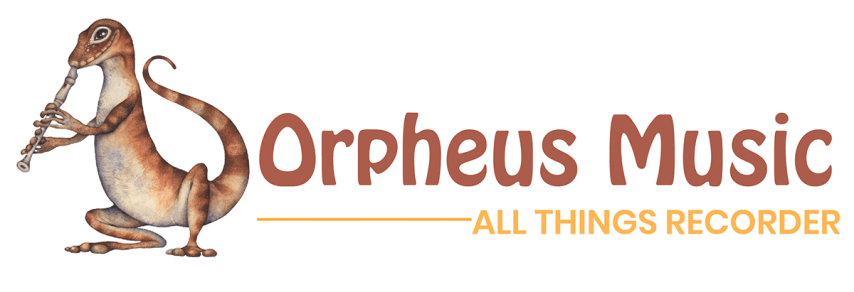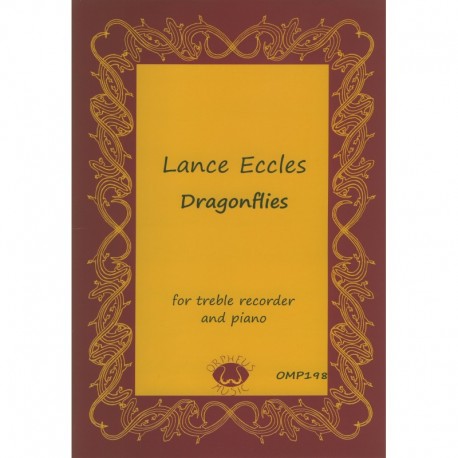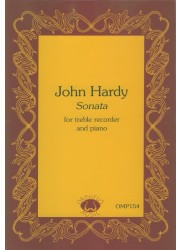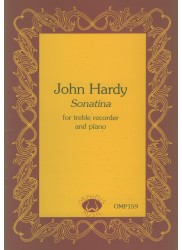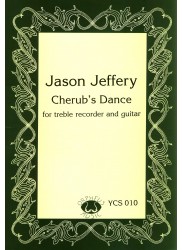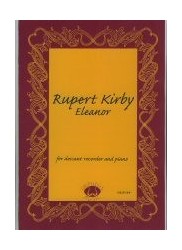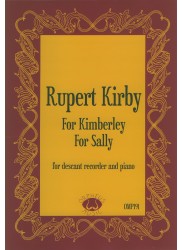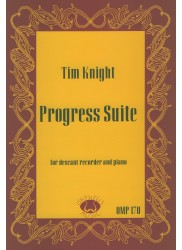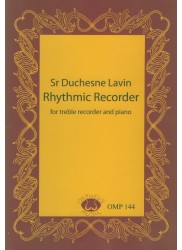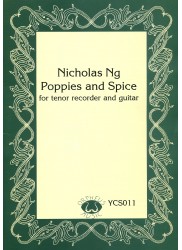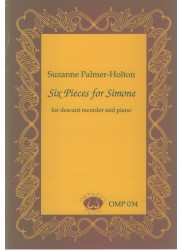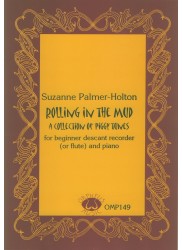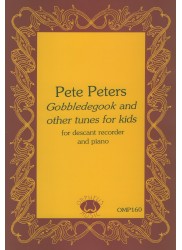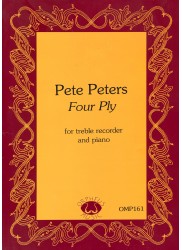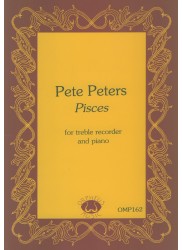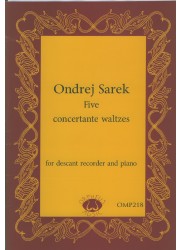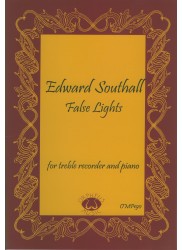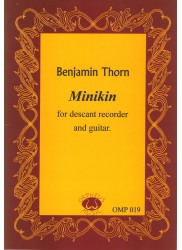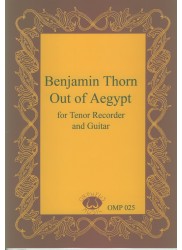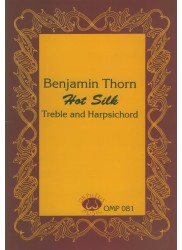No products
Prices are tax included
Dragonflies
Composer: Eccles - Lance
Instrumentation: Treble + Piano
Period/genre: Australian Contemporary
More info
*Short Attractive Character Piece* with some high notes.
1. Dragonflies
_Score 3 pp. Part 1 pp._
OMP198 Lance Eccles Gecko Dragonflies
OMP144 Sr. Duchesne Lavin Rhythmic Recorder
OMP190 Edward Southall FALSE LIGHTS
These three recent editions of music for alto recorder and piano from Orpheus Music are typical of the range of material available from this enterprising Australian publisher, which provides a valuable service by offering such a scope of works by composers of varying backgrounds.
Lance Eccles is a prolific composer for recorder with a lively sense of humor. Dragonflies is a tuneful evocation of the creatures, and places only moderate demands on both players.
Written in a flowing 3/8 time, the piece features a lyrical recorder part that uses the upper range of the alto to good effect. The melody is broken occasionally with trills and tremoli and the piano accompaniment features darting arpeggiated figures, all of which suggest the whirring wings and sudden gestures of the dragonfly. There are some abrupt harmonic shifts, but these, too, suggest the random movements of the dragonfly's flight. At about two minutes' playing time, the piece does not wear out its welcome and would make an entertaining novelty for a recital program.
Sr. Duchesne Lavin's set of four short pieces entitled Rhythmic Recorder also paints a series of tone pictures and would be quite manageable by lower intermediate players. "Jazz Waltz" and "Rondo Rag" have the strongest rhythmic characteristics, while "Pensive" and "Pentatonic" provide a reflective contrast.
The writing is simpler here and the effects less dramatic than in the Eccles, though "Rondo Rag" has a nice jazzy feel and some challenging syncopations. The collection would probably work best for a beginner looking for new challenges.
Edward Southall's False Lights is at the other end of the spectrum, filled with challenging writing and subtle effects. Its overall style is reminiscent of later Arnold Schoenberg, with disjunct melodies, pervasive dissonance, and extremely detailed dynamic and articulation markings. A composer's note describes the piece as having been "inspired by tales of the deliberate wrecking of ships sailing near to the east coast of England."
The character of the opening and closing seems to evoke the eerie coastal setting, while the middle section, marked "weightless and simple," is scherzo-like. Throughout, the complex interplay between the two instruments will provide a challenge even for advanced players, as will the necessity of maintaining a clear forward direction with such fragmented musical material. While the dynamic markings are wide-ranging and detailed, they tend to follow the rise and fall of the line in the recorder part and so should generally have their intended effect.
This style is not often encountered in music written for the recorder, and so will prove intriguing for the skilled and adventuresome player.
All three editions are thoughtfully and attractively presented. Although there are a number of discrepancies between the score and part in Rhythmic Recorder, the two can easily be reconciled with a few minutes' careful comparison.
Scott Paterson, American Recorder, May 2012
30 other products in the same category:
Reference: OMP154
Brand: Orpheus Music
Sonata
Composer: Hardy - John Instrumentation: Treble + Piano Period/genre:...
In StockReference: OMP154.pdf
Brand: Orpheus Music
Sonata
PLEASE NOTE - DOWNLOADABLE PDF VERSION Composer: Hardy - John...
$23.50 -20%In StockReference: OMP159
Brand: Orpheus Music
Sonatina
Composer: Hardy - John Instrumentation: Treble + Piano Period/genre:...
In StockReference: OMP159.pdf
Brand: Orpheus Music
Sonatina
PLEASE NOTE - DOWNLOADABLE PDF VERSION Composer: Hardy - John...
$19.00 -20%In StockReference: YCS010
Brand: Orpheus Music
Cherub's Dance
Composer: Jeffery - Jason Instrumentation: Treble + Guitar Period/genre:...
In StockReference: YCS010.pdf
Brand: Orpheus Music
Cherub's Dance
PLEASE NOTE - DOWNLOADABLE PDF VERSION Composer: Jeffery - Jason...
$16.00 -20%In StockReference: OMP184
Brand: Orpheus Music
Eleanor
Composer: Kirby - Rupert Instrumentation: Descant + Piano Period/genre:...
In StockReference: OMP184.pdf
Brand: Orpheus Music
Eleanor
PLEASE NOTE - DOWNLOADABLE PDF VERSION Composer: Kirby - Rupert...
$14.50 -20%In StockReference: OMP191
Brand: Orpheus Music
For Kimberley and For Sally
Composer: Kirby - Rupert Instrumentation: Descant + Piano Period/genre:...
In StockReference: OMP191.pdf
Brand: Orpheus Music
For Kimberley and For Sally
PLEASE NOTE - DOWNLOADABLE PDF VERSION Composer: Kirby - Rupert...
$16.00 -20%In StockReference: OMP170
Brand: Orpheus Music
Progress Suite
Composer: Knight - Tim Instrumentation: Descant + Piano Period/genre:...
In StockReference: OMP170.pdf
Brand: Orpheus Music
Progress Suite
PLEASE NOTE - DOWNLOADABLE PDF VERSION Composer: Knight - Tim...
$16.00 -20%In StockReference: OMP144.pdf
Brand: Orpheus Music
Rhythmic Recorder
PLEASE NOTE - DOWNLOADABLE PDF VERSION Composer: Lavin - Sr Duchesne...
$17.50 -20%In StockReference: YCS011
Brand: Orpheus Music
Poppies and Spice
Composer: Ng - Nicholas Instrumentation: Tenor + Guitar Period/genre:...
In StockReference: OMP034
Brand: Orpheus Music
Six Pieces for Simone
Composer: Palmer-Holton - Suzanne Instrumentation: Descant + Piano...
In StockReference: OMP149
Brand: Orpheus Music
Rolling in the Mud
Composer: Palmer-Holton - Suzanne Instrumentation: Descant + Piano...
In StockReference: OMP034.pdf
Brand: Orpheus Music
Six Pieces for Simone
PLEASE NOTE - DOWNLOADABLE PDF VERSION Composer: Palmer-Holton - Suzanne...
$14.50 -20%In StockReference: OMP160
Brand: Orpheus Music
Gobbledegook and other tunes for kids
Composer: Peters - Pete Instrumentation: Descant + Piano Period/genre:...
In StockReference: OMP161
Brand: Orpheus Music
Four Ply
Composer: Peters - Pete Instrumentation: Treble + Piano Period/genre:...
In StockReference: OMP162
Brand: Orpheus Music
Pisces
Composer: Peters - Pete Instrumentation: Treble + Piano Period/genre:...
In StockReference: OMP218
Brand: Orpheus Music
Five Concertante Waltzes
Composer: Sarek - Ondrej Instrumentation: Descant + Piano Period/genre:...
In StockReference: OMP218.pdf
Brand: Orpheus Music
Five Concertante Waltzes
PLEASE NOTE - DOWNLOADABLE PDF VERSION Composer: Sarek - Ondrej...
$20.50 -20%In StockReference: OMP190
Brand: Orpheus Music
False Lights
Composer: Southall - Edward Instrumentation: Treble + Piano Period/genre:...
In StockReference: OMP190.pdf
Brand: Orpheus Music
False Lights
PLEASE NOTE - DOWNLOADABLE PDF VERSION Composer: Southall - Edward...
$16.00 -20%In StockReference: OMP019
Brand: Orpheus Music
Minikin
Composer: Thorn - Benjamin Instrumentation: Descant + Guitar Period/genre:...
In StockReference: OMP019.pdf
Brand: Orpheus Music
Minikin
PLEASE NOTE - DOWNLOADABLE PDF VERSION Composer: Thorn - Benjamin...
$14.50 -20%In StockReference: OMP025
Brand: Orpheus Music
Out of Aegypt
Composer: Thorn - Benjamin Instrumentation: Treble/Tenor + Guitar...
In StockReference: OMP025.pdf
Brand: Orpheus Music
Out of Aegypt
PLEASE NOTE - DOWNLOADABLE PDF VERSION Composer: Thorn - Benjamin...
$16.00 -20%In StockReference: OMP081
Brand: Orpheus Music
Hot Silk
Composer: Thorn - Benjamin Instrumentation: Treble + Harpsichord...
In StockReference: OMP081.pdf
Brand: Orpheus Music
Hot Silk
PLEASE NOTE - DOWNLOADABLE PDF VERSION Composer: Thorn - Benjamin...
$17.50 -20%In Stock
